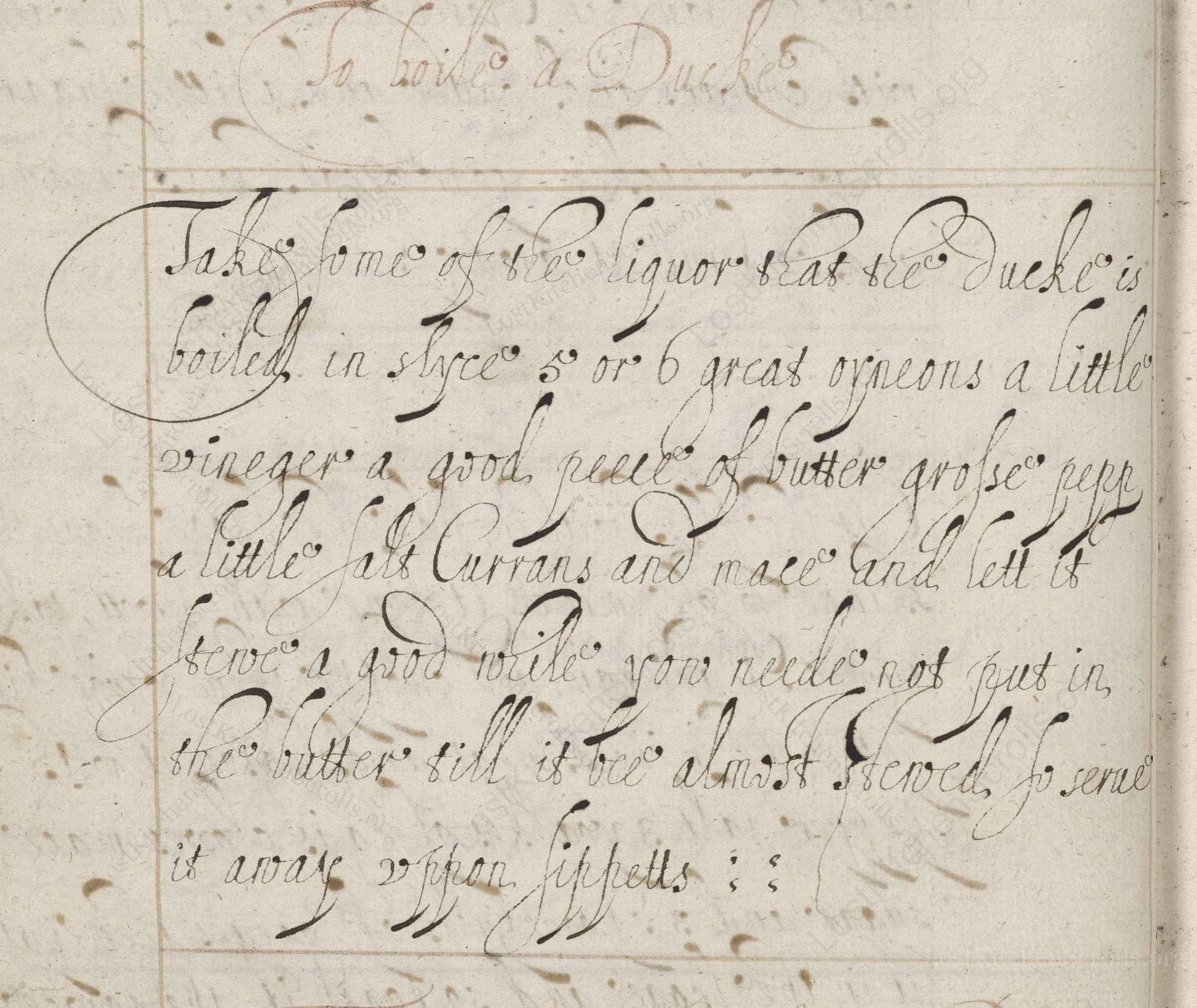To Boile A Ducke
From the treasured pages of Medicinal and cookery recipes by John King
Written by John King

To Boile A Ducke
"Take some of the liquor that the Ducke is boild in, shrece 5 or 6 great onneons, a little vineger a good peece of butterr, grosse pepp, a little salt Currans and mace, and lett it boile a good while, yow neede not put in, the butterr till it bee almost stewed, so serve it upon sippetts ::"
Note on the Original Text
The recipe is written in early modern English, featuring phonetic spellings ('shrece' for 'shred', 'onneons' for 'onions', 'grosse pepp' for 'gross pepper', meaning coarsely ground pepper) and minimal instruction. Quantities are loose, reflecting a cook's intuition rather than measurement. Directions expect the reader to understand terms like 'sippets' and to be familiar with boiling and stewing methods. The order of ingredient addition and timing is suggested rather than fixed, a typical approach when recipes were passed between skilled home cooks rather than written for beginners.

Title
Medicinal and cookery recipes by John King (1675)
You can also click the book image above to peruse the original tome
Writer
John King
Era
1675
Publisher
Unknown
Background
A delightful journey into the kitchens of the 17th and early 18th centuries, this collection, attributed to John King, brims with time-honored recipes, culinary wisdom, and flavors that once graced historic tables.
Kindly made available by
Folger Shakespeare Library
This recipe comes from a manuscript associated with John King, compiled sometime between 1625 and 1725—a period when English kitchens were lively with new ingredients and evolving culinary methods. Intended for the upper classes, such recipes blended savory meats with sweet and tangy notes—here, onions, currants, and vinegar create a complex sauce for a boiled duck. The presence of imported spices like mace and currants highlights the reach of the British trade routes at the time, while the use of sippets (toasted bread) reflects practical and popular serving traditions of the day. Recipes from this era were typically handed down in manuscript form, exchanging practical details among family and friends, rather than being mass-published.

Cooks of the early modern period would have used a large iron or copper cauldron or pot suspended over the hearth fire to boil the duck. Slicing was done with simple, sharp kitchen knives, and the onions would be cooked alongside the meat. A wooden spoon, a ladle for serving the broth, and bread knives for slicing sippets completed the ensemble. The sauce would have been simmered in a pot, perhaps set at the edge of the fire for gentle heating. Serving was informal but practical, with toasted or fried bread forming a 'bed' on a large trencher or platter for the meat and sauce.
Prep Time
25 mins
Cook Time
2 hrs
Servings
6
We've done our best to adapt this historical recipe for modern kitchens, but some details may still need refinement. We warmly welcome feedback from fellow cooks and culinary historians — your insights support the entire community!
Ingredients
- 1 whole duck (about 4 1/2 lbs)
- 5–6 large onions (approx. 1 2/3 lbs), sliced
- 3 1/4 cups duck cooking liquid (broth)
- 2 tablespoons red wine vinegar
- 3 1/2 tablespoons (1/2 stick) unsalted butter
- 2 teaspoons coarsely cracked black pepper
- 1 teaspoon salt
- 1/4 cup dried currants (or substitute with raisins or dried barberries)
- 1–2 blades of mace (or 1/4 teaspoon ground mace)
- Sippets: 3 1/2 oz bread, sliced and toasted or fried
Instructions
- Begin by boiling a whole duck in a large pot of water until tender, reserving some of the flavorful cooking liquid.
- Thinly slice 5 or 6 large onions and add them to about 3 1/4 cups of the duck broth.
- Stir in 2 tablespoons of red wine vinegar, 3 1/2 tablespoons (1/2 stick) of unsalted butter, a generous amount of coarsely cracked black pepper, a pinch of salt, 1/4 cup of currants, and one or two blades of mace (or 1/4 teaspoon ground mace if unavailable).
- Let this mixture simmer over medium heat for 20-30 minutes, allowing the flavors to meld and the onions to soften.
- Add the butter towards the end of cooking, just before serving.
- Serve the duck and the sauce over sippets—small toasted or fried pieces of bread—on a platter.
Estimated Calories
650 per serving
Cooking Estimates
Cooking the duck takes about 1.5 hours, while prepping the ingredients and sauce takes about 25 minutes. Each serving has about 650 calories, and the recipe serves 6 people.
As noted above, we have made our best effort to translate and adapt this historical recipe for modern kitchens, taking into account ingredients nowadays, cooking techniques, measurements, and so on. However, historical recipes often contain assumptions that require interpretation.
We'd love for anyone to help improve these adaptations. Community contributions are highly welcome. If you have suggestions, corrections, or cooking tips based on your experience with this recipe, please share them below.
Join the Discussion
Rate This Recipe
Dietary Preference
Main Ingredients
Occasions

Den Bockfisch In Einer Fleisch Suppen Zu Kochen
This recipe hails from a German manuscript cookbook compiled in 1696, a time whe...

Die Grieß Nudlen Zumachen
This recipe comes from a rather mysterious manuscript cookbook, penned anonymous...

Ein Boudain
This recipe comes from an anonymous German-language manuscript cookbook from 169...

Ein Gesaltzen Citroni
This recipe, dating from 1696, comes from an extensive anonymous German cookbook...
Browse our complete collection of time-honored recipes



